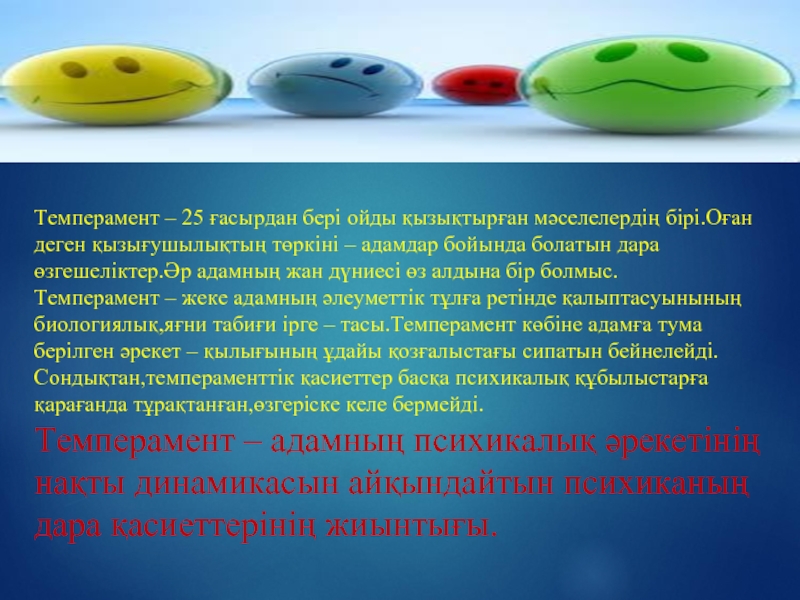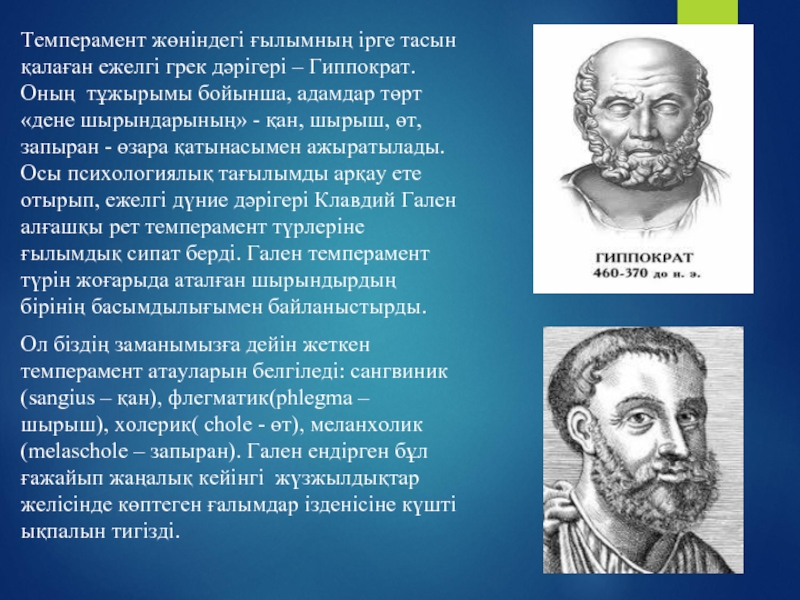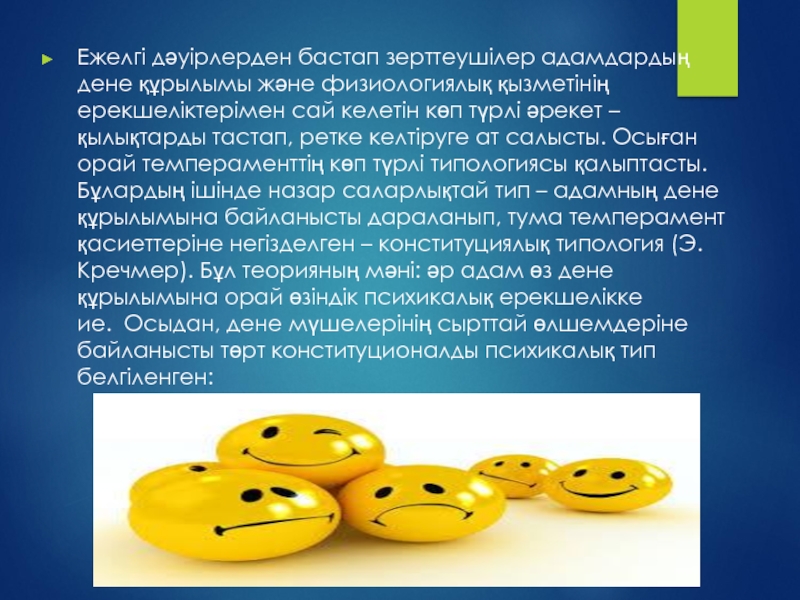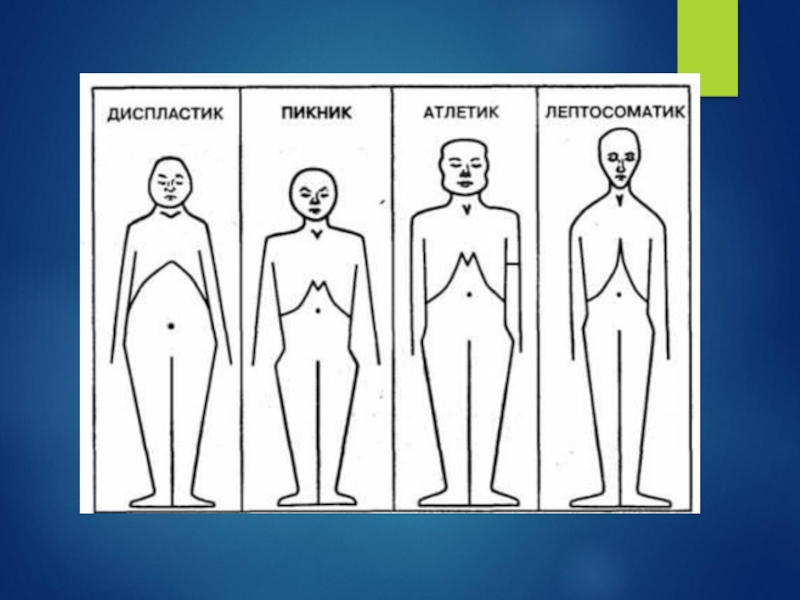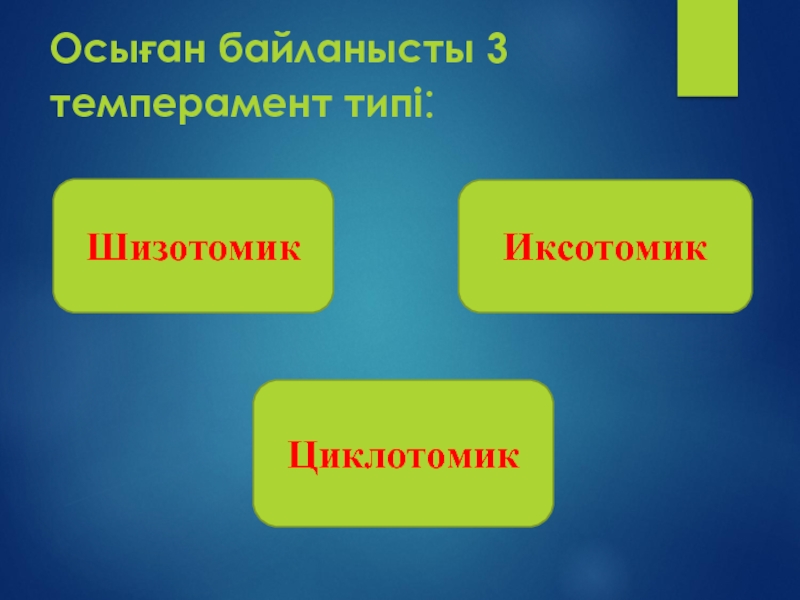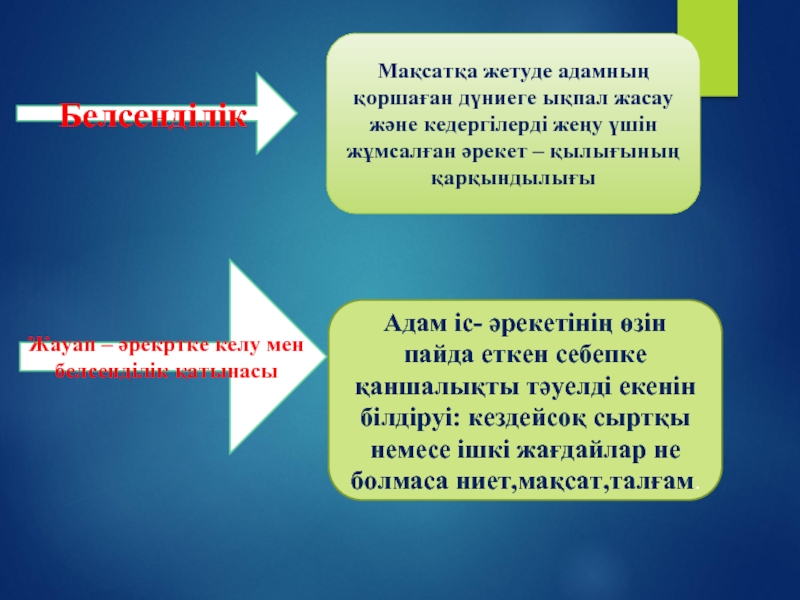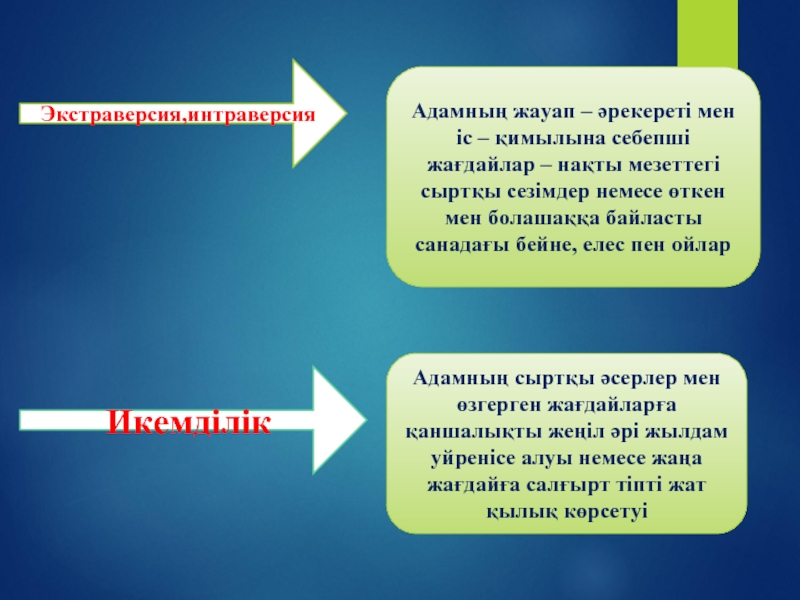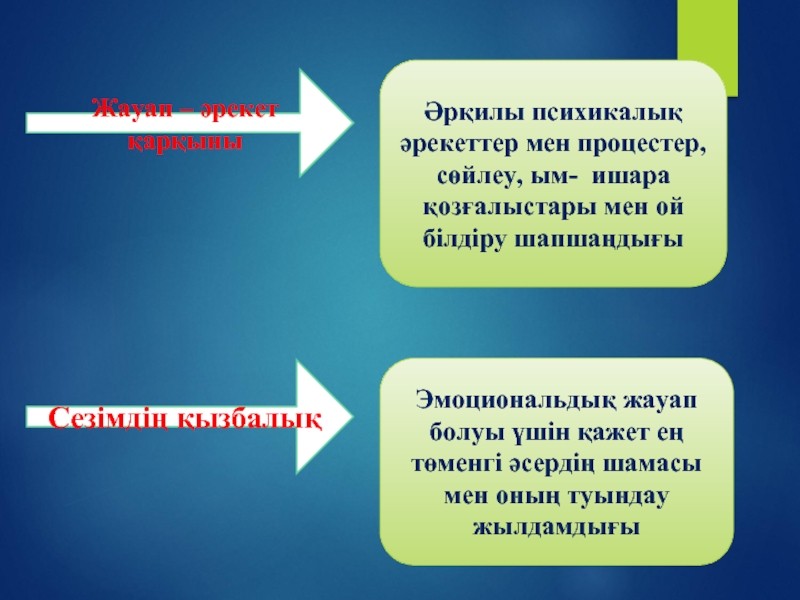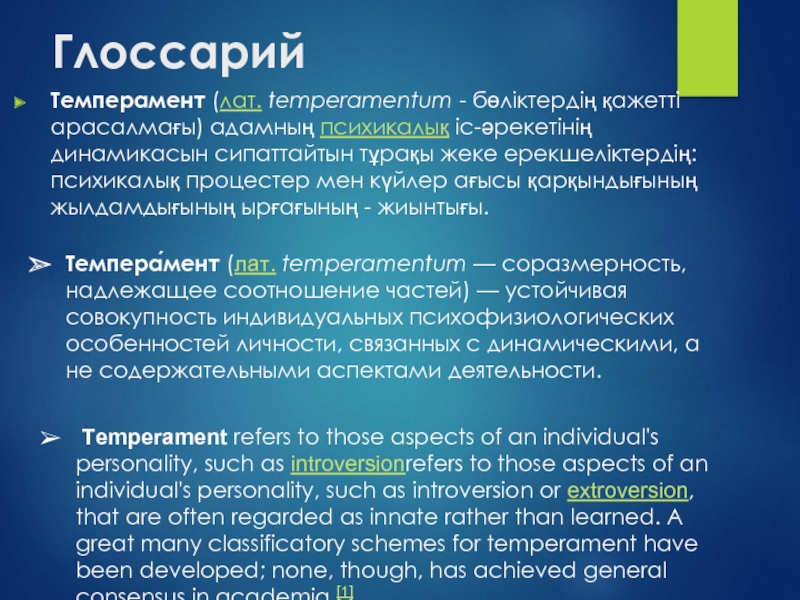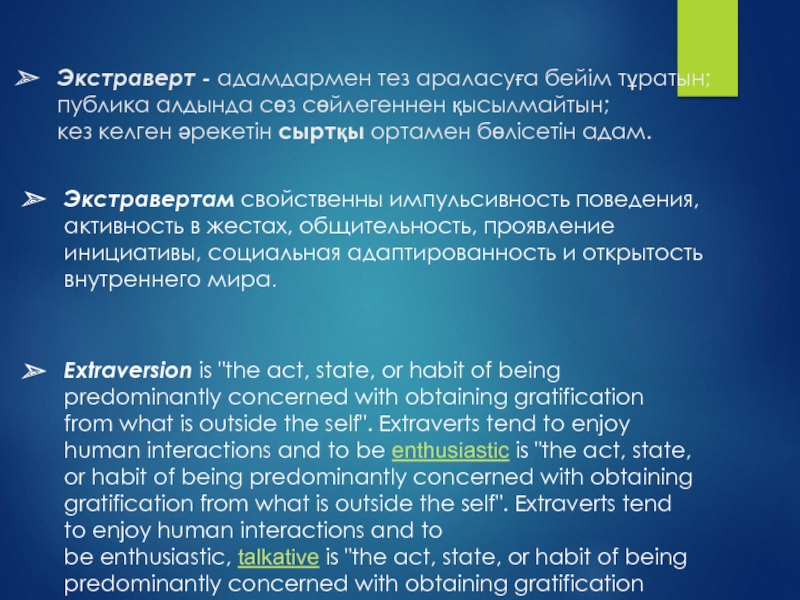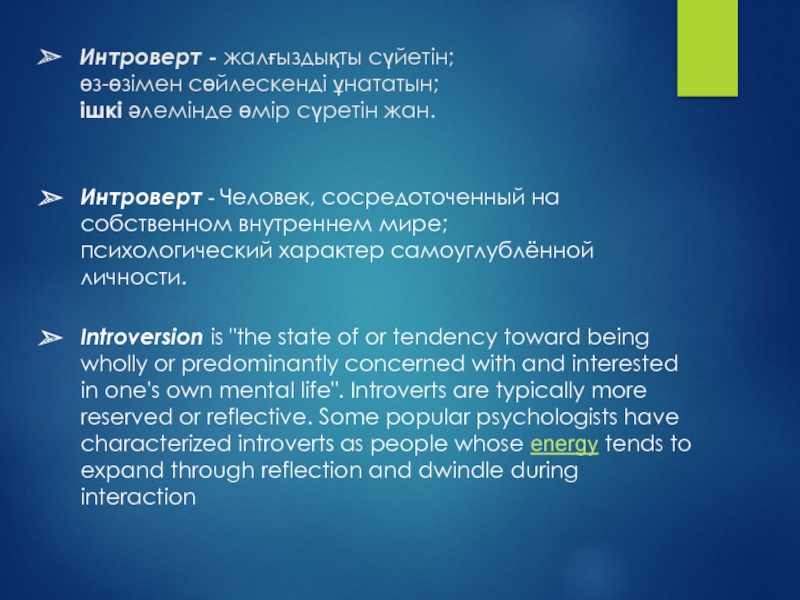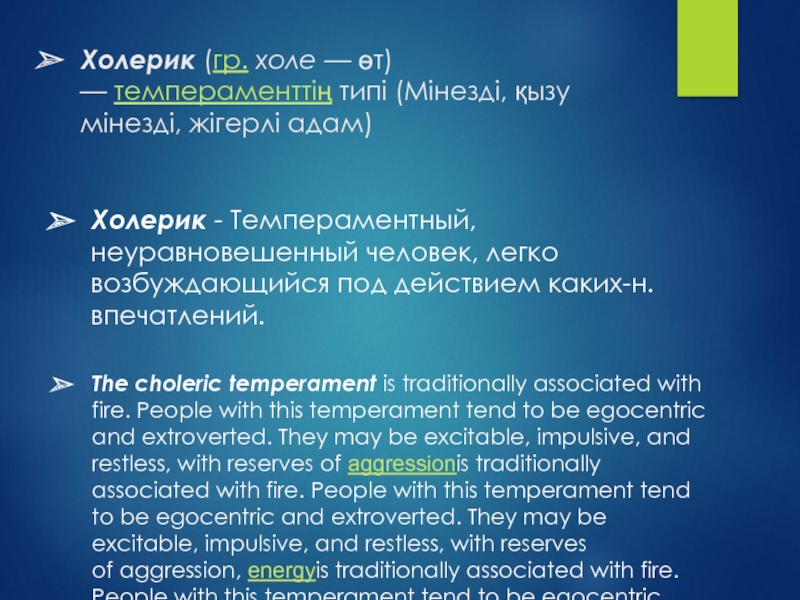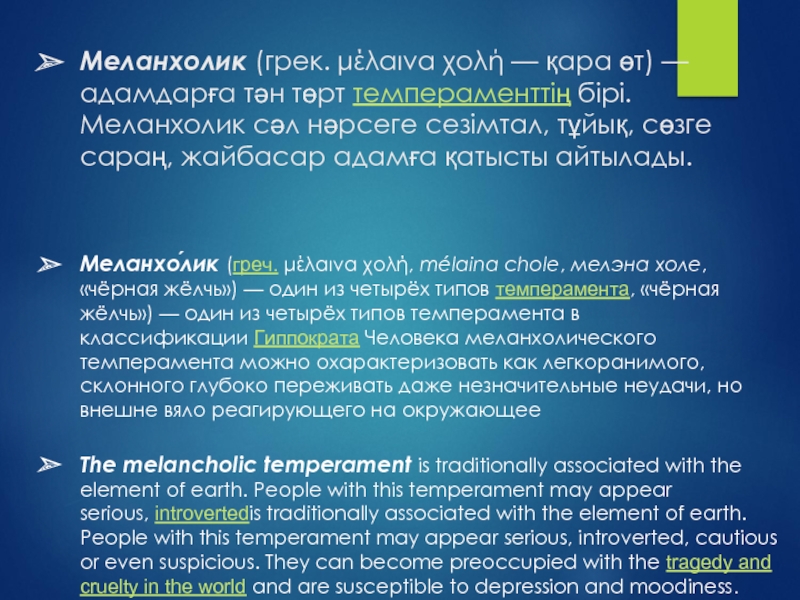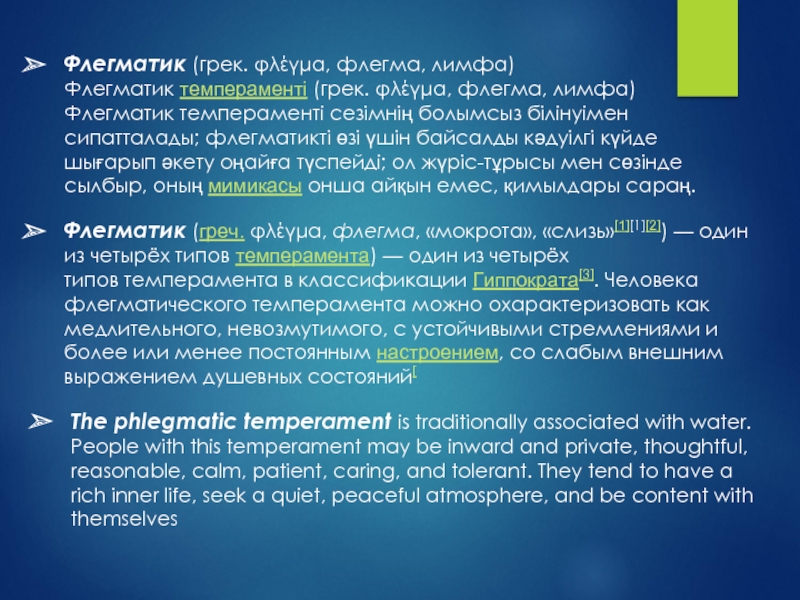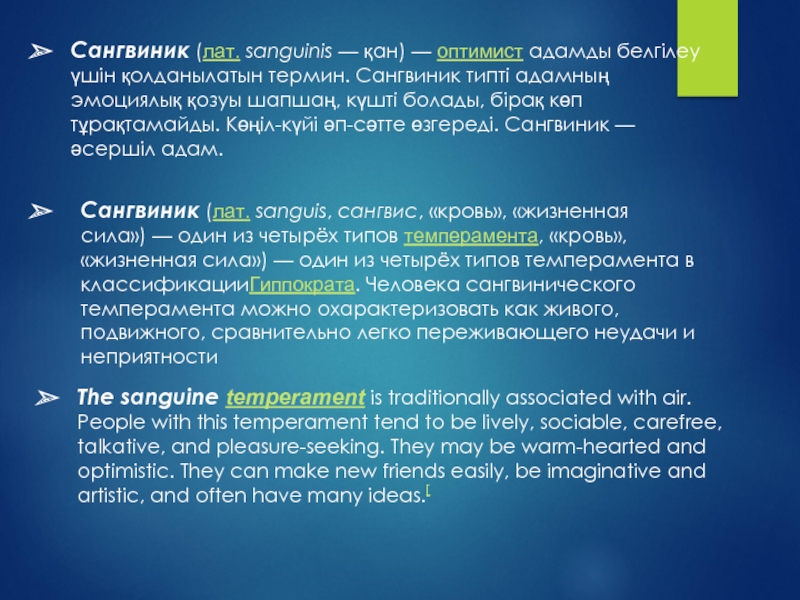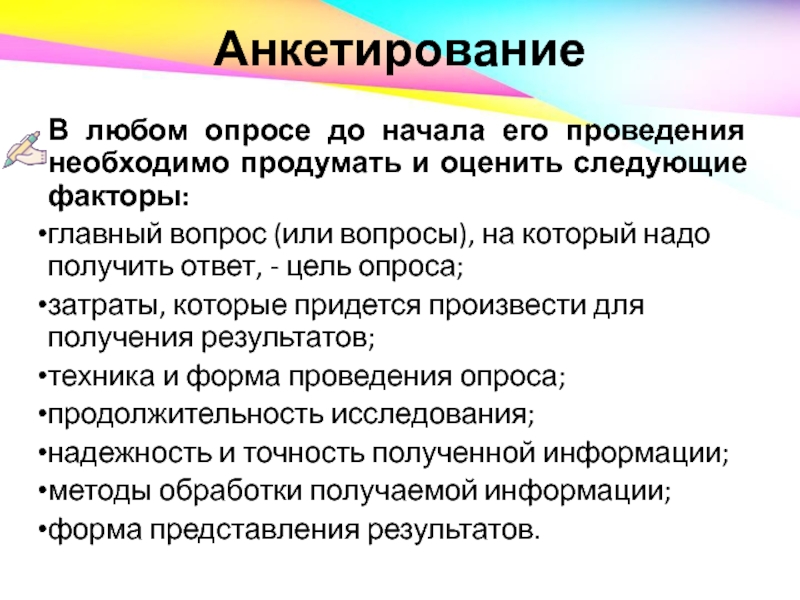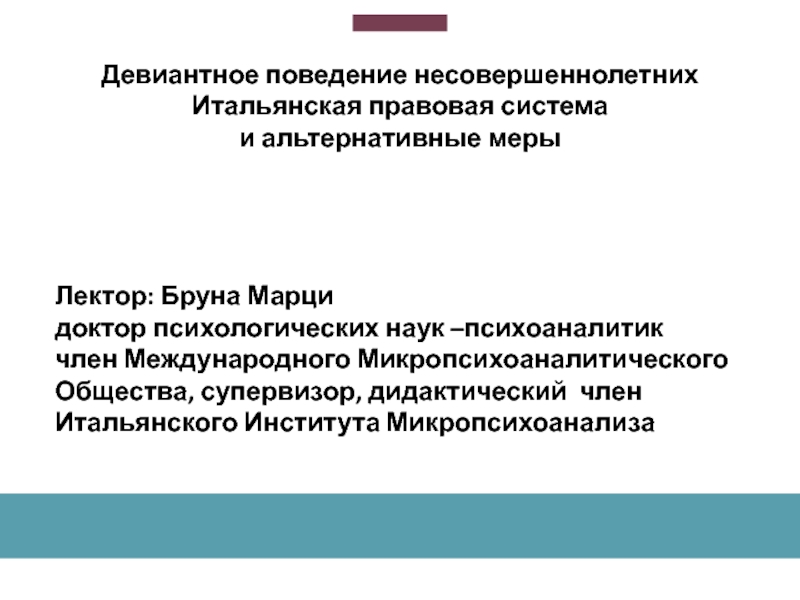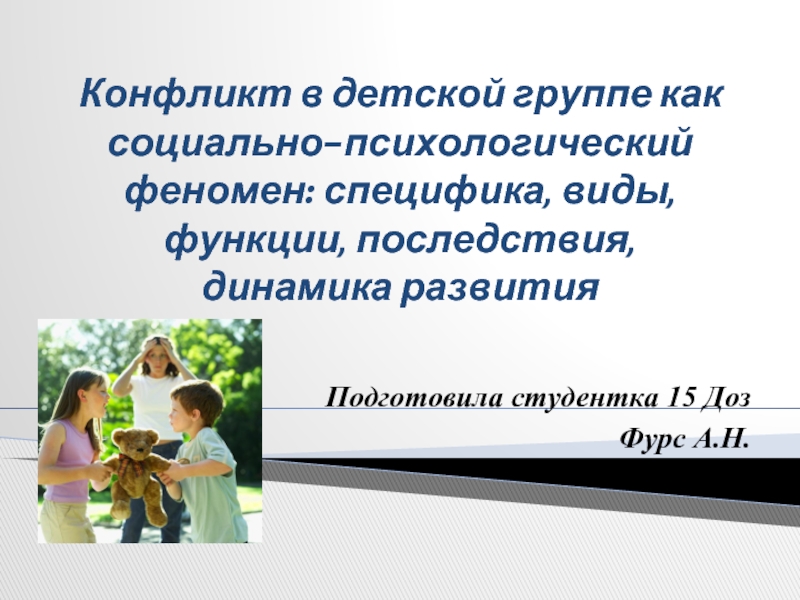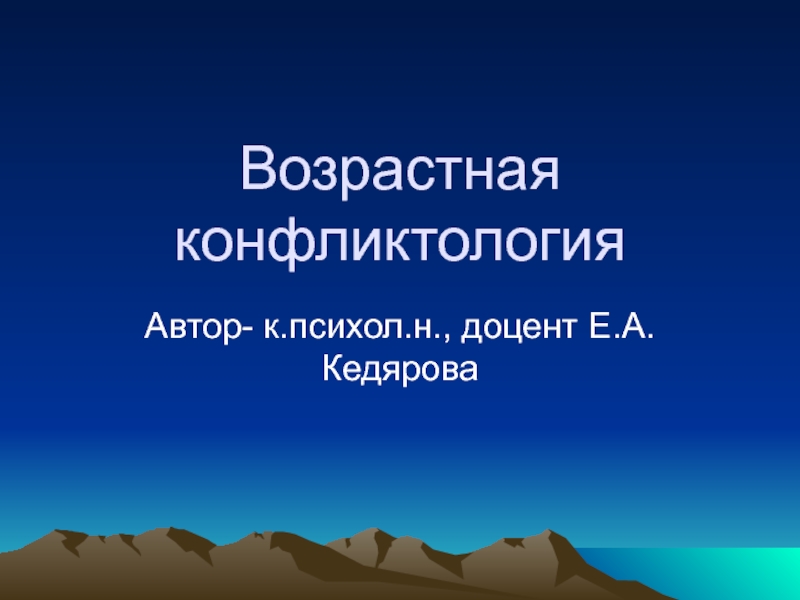- Главная
- Разное
- Дизайн
- Бизнес и предпринимательство
- Аналитика
- Образование
- Развлечения
- Красота и здоровье
- Финансы
- Государство
- Путешествия
- Спорт
- Недвижимость
- Армия
- Графика
- Культурология
- Еда и кулинария
- Лингвистика
- Английский язык
- Астрономия
- Алгебра
- Биология
- География
- Детские презентации
- Информатика
- История
- Литература
- Маркетинг
- Математика
- Медицина
- Менеджмент
- Музыка
- МХК
- Немецкий язык
- ОБЖ
- Обществознание
- Окружающий мир
- Педагогика
- Русский язык
- Технология
- Физика
- Философия
- Химия
- Шаблоны, картинки для презентаций
- Экология
- Экономика
- Юриспруденция
Темперамент жөнінде түсінік презентация
Содержание
- 1. Темперамент жөнінде түсінік
- 2. Жоспар Темперамент жөнінде түсінік. Темперамент туралы теориялар.
- 3. Темперамент – 25 ғасырдан бері ойды қызықтырған
- 4. Темперамент жөніндегі ғылымның ірге тасын қалаған ежелгі
- 5. Ежелгі дәуірлерден бастап зерттеушілер адамдардың дене құрылымы
- 6. Лептосоматик- бойшаң, нәзік денелі, тар иықты, қол-аяғы
- 8. Осыған байланысты 3 темперамент типі: Шизотомик Иксотомик Циклотомик
- 9. И.П.Павлов темперамент типінің жүйке қасиеттері ретінде:
- 10. Темперамент қасиеттері: Сезімталдық Адамның қандай да психикалық
- 11. Белсенділік Мақсатқа жетуде адамның қоршаған дүниеге ықпал
- 12. Экстраверсия,интраверсия Адамның жауап – әрекереті мен іс
- 13. Жауап – әрекет қарқыны Әрқилы психикалық әрекеттер
- 14. Холерик Бұл темперамент өкілі тездігімен, шапшаңдылығымен, ұстамсыздығымен,
- 15. Сангвиник Бұл темпераменттің өкілін И.П.Павлов
- 16. Флегматик. Бұл типтің өкілі баяу,
- 17. Меланхолик Бұл типтің өкілдері аса сезімтал
- 18. Глоссарий Темперамент (лат. temperamentum - бөліктердің қажетті арасалмағы) адамның психикалық іс-әрекетінің динамикасын
- 19. Экстраверт - адамдармен тез араласуға бейім тұратын;
- 20. Интроверт - жалғыздықты сүйетін; өз-өзімен сөйлескенді ұнататын;
- 21. Холерик (гр. холе — өт) — темпераменттің типі (Мінезді, қызу мінезді, жігерлі
- 22. Меланхолик (грек. μέλαινα χολή — қара өт) —
- 23. Флегматик (грек. φλέγμα, флегма, лимфа) Флегматик темпераменті (грек.
- 24. Сангвиник (лат. sanguinis — қан) — оптимист адамды белгілеу үшін қолданылатын термин.
Слайд 2Жоспар
Темперамент жөнінде түсінік.
Темперамент туралы теориялар.
Темперамент түрлері және олардың психологиялық сипаттамасы.
Темперамент және
Слайд 3Темперамент – 25 ғасырдан бері ойды қызықтырған мәселелердің бірі.Оған деген қызығушылықтың
Темперамент – жеке адамның әлеуметтік тұлға ретінде қалыптасуынының биологиялық,яғни табиғи ірге – тасы.Темперамент көбіне адамға тума берілген әрекет – қылығының ұдайы қозғалыстағы сипатын бейнелейді.Сондықтан,темпераменттік қасиеттер басқа психикалық құбылыстарға қарағанда тұрақтанған,өзгеріске келе бермейді.
Темперамент – адамның психикалық әрекетінің нақты динамикасын айқындайтын психиканың дара қасиеттерінің жиынтығы.
Слайд 4Темперамент жөніндегі ғылымның ірге тасын қалаған ежелгі грек дәрігері – Гиппократ.Оның
Ол біздің заманымызға дейін жеткен темперамент атауларын белгіледі: сангвиник (sangius – қан), флегматик(phlegma – шырыш), холерик( chole - өт), меланхолик(melaschole – запыран). Гален ендірген бұл ғажайып жаңалық кейінгі жүзжылдықтар желісінде көптеген ғалымдар ізденісіне күшті ықпалын тигізді.
Слайд 5Ежелгі дәуірлерден бастап зерттеушілер адамдардың дене құрылымы және физиологиялық қызметінің ерекшеліктерімен
Слайд 6Лептосоматик- бойшаң, нәзік денелі, тар иықты, қол-аяғы ұзын, сидыйған.
Пикник- мығым, сезімшең,
Атлетик- бұлшық еттері күшті дамыған, денесі мығым, берік, ұзынша не орта бойлы, кең иықты, жамбас сүйектері тартылған
Диспластик-дене бітімі қисынсыз. Бұл адамдар әрқилы мүшелік зақымдарға ұшырағандар.
Слайд 9
И.П.Павлов темперамент типінің жүйке қасиеттері ретінде:
Қозу мен тежелу күшін;
Тепе – теңдігін;
Қозғалмалылығын;
атап
Слайд 10Темперамент қасиеттері:
Сезімталдық
Адамның қандай да психикалық жауап әрекетінің пайда болуына себепші сыртқы
Жауап – әрекетке келу
Бірдей ықпалды сыртқы не ішкі әсерлерге болған ырықсыз жауап – әрекет дәрежесі
Слайд 11Белсенділік
Мақсатқа жетуде адамның қоршаған дүниеге ықпал жасау және кедергілерді жеңу үшін
Жауап – әрекртке келу мен белсенділік қатынасы
Адам іс- әрекетінің өзін пайда еткен себепке қаншалықты тәуелді екенін білдіруі: кездейсоқ сыртқы немесе ішкі жағдайлар не болмаса ниет,мақсат,талғам.
Слайд 12Экстраверсия,интраверсия
Адамның жауап – әрекереті мен іс – қимылына себепші жағдайлар –
Икемділік
Адамның сыртқы әсерлер мен өзгерген жағдайларға қаншалықты жеңіл әрі жылдам уйренісе алуы немесе жаңа жағдайға салғырт тіпті жат қылық көрсетуі
Слайд 13Жауап – әрекет қарқыны
Әрқилы психикалық әрекеттер мен процестер,сөйлеу, ым- ишара қозғалыстары
Сезімдің қызбалық
Эмоциональдық жауап болуы үшін қажет ең төменгі әсердің шамасы мен оның туындау жылдамдығы
Слайд 14Холерик
Бұл темперамент өкілі тездігімен, шапшаңдылығымен, ұстамсыздығымен, тым қозғалғыштығымен ерекшеленеді. Оларда психикалық
Слайд 15
Сангвиник
Бұл темпераменттің өкілін И.П.Павлов қызу қанды, іскер адам деп санайды.
Сангвиникке қимыл қозғалыста – белсенділік, өмір жағдайының өзгеруіне жеңіл бейімдеушілік тән. Ол адамдармен тез тіл тауып, шүйіркелесе кетеді, жұртты жатырқамайды. Ұжым ішінде сангвиник көңілді ақ-жарқын, іске бар ықыласымен кірісетін, әуесқой адам. Осылайша жалындап тұрғанымен іске зауқы болмаса, яғни күнделікті күйбеңі, төзімділікпен ерінбей-жалықпай істеуді қажет ететін жұмыс тап болғанда суынып қалады.
Сангвиникте эмоция тез пайда болып, тез өзгереді. Бұл — оның көңіл күйінің қолайсыз түрінен тез арылып, өзін қызықтырған іске кіріскен кезде ақ жарқын, жаны жайсаң жағдайға түсе алатындығының белгісі. Мида жаңадан жасалатын уақытша байланыстардың тез өзгеріп, қайтадан өңделуі оның ақыл-ойының оңтайлылығын байқатады. Сангвиник ойға жүйрік, өткір тілді, жаңаны тез қабылдағыш, зейінді келеді. Әр түрлі, көп қырлы жұмысты нәтижелі атқарады. Бір қалыптылықты және шапшаңдықты тілейтін жұмыстар бұған өте қолайлы.
Слайд 16
Флегматик.
Бұл типтің өкілі баяу, байсалды, асықпайды. Істі ойланып, төзімділікпен істейді. Жинақылықты,
Слайд 17
Меланхолик
Бұл типтің өкілдері аса сезімтал соның салдарынан жаны тез жараланғыш келеді.
Қозу және тежелу үрдістерінің әлсіздігі бұлардың бір-бірімен тең келмеуі, кез келген күшті әсер -меланхоликтің қимыл қозғалысын баяулатып, онда шектен тыс тежелу туғызады. Меланхоликті әлсіз тітіркендіргіштер де мазалайды, одан да зор әсер алады, сондықтан да ол ұсак-түйектің бәріне де қатты мұңаяды немесе қатты қуанады. Психологтар мұны меланхоликтердің күшті сезіне білу қабілетінен деп есептейді. Үйреншікті жақсы, тату ұжым арасында меланхоликтер өзін жақсы ұстайды, жұртпен қарым-қатысқа түсіп, алған ісін нәтижелі орындай алады, кедергілерді жеңіп, табандылық көрсетеді. Темпераменттің негізгі төрт типінің өкілдері бір қалыпты жағдайдың өзінде өздерін түрліше ұстайды екен. Осылайша темперамент адамның белсенділік сипатынан, мінез-құлықтың түрлі қалпынан үнемі өзгерістегі сыртқы ортаға бейімделе алу жағдайынан көрініп отырады.
Слайд 18Глоссарий
Темперамент (лат. temperamentum - бөліктердің қажетті арасалмағы) адамның психикалық іс-әрекетінің динамикасын сипаттайтын тұрақы жеке ерекшеліктердің: психикалық
Темпера́мент (лат. temperamentum — соразмерность, надлежащее соотношение частей) — устойчивая совокупность индивидуальных психофизиологических особенностей личности, связанных с динамическими, а не содержательными аспектами деятельности.
Temperament refers to those aspects of an individual's personality, such as introversionrefers to those aspects of an individual's personality, such as introversion or extroversion, that are often regarded as innate rather than learned. A great many classificatory schemes for temperament have been developed; none, though, has achieved general consensus in academia.[1]
Слайд 19Экстраверт - адамдармен тез араласуға бейім тұратын; публика алдында сөз сөйлегеннен қысылмайтын; кез
Экстравертам свойственны импульсивность поведения, активность в жестах, общительность, проявление инициативы, социальная адаптированность и открытость внутреннего мира.
Extraversion is "the act, state, or habit of being predominantly concerned with obtaining gratification from what is outside the self". Extraverts tend to enjoy human interactions and to be enthusiastic is "the act, state, or habit of being predominantly concerned with obtaining gratification from what is outside the self". Extraverts tend to enjoy human interactions and to be enthusiastic, talkative is "the act, state, or habit of being predominantly concerned with obtaining gratification from what is outside the self". Extraverts tend to enjoy human interactions and to be enthusiastic, talkative, assertive is "the act, state, or habit of being predominantly concerned with obtaining gratification from what is outside the self". Extraverts tend to enjoy human interactions and to be enthusiastic, talkative, assertive, and gregarious
Слайд 20Интроверт - жалғыздықты сүйетін;
өз-өзімен сөйлескенді ұнататын;
ішкі әлемінде өмір сүретін жан.
Интроверт - Человек,
Introversion is "the state of or tendency toward being wholly or predominantly concerned with and interested in one's own mental life". Introverts are typically more reserved or reflective. Some popular psychologists have characterized introverts as people whose energy tends to expand through reflection and dwindle during interaction
Слайд 21Холерик (гр. холе — өт) — темпераменттің типі (Мінезді, қызу мінезді, жігерлі адам)
Холерик - Темпераментный, неуравновешенный
The choleric temperament is traditionally associated with fire. People with this temperament tend to be egocentric and extroverted. They may be excitable, impulsive, and restless, with reserves of aggressionis traditionally associated with fire. People with this temperament tend to be egocentric and extroverted. They may be excitable, impulsive, and restless, with reserves of aggression, energyis traditionally associated with fire. People with this temperament tend to be egocentric and extroverted. They may be excitable, impulsive, and restless, with reserves of aggression, energy, and/or passion, and try to instill that in others.
Слайд 22Меланхолик (грек. μέλαινα χολή — қара өт) — адамдарға тән төрт темпераменттің бірі. Меланхолик
Меланхо́лик (греч. μέλαινα χολή, mélaina chole, мелэна холе, «чёрная жёлчь») — один из четырёх типов темперамента, «чёрная жёлчь») — один из четырёх типов темперамента в классификации Гиппократа Человека меланхолического темперамента можно охарактеризовать как легкоранимого, склонного глубоко переживать даже незначительные неудачи, но внешне вяло реагирующего на окружающее
The melancholic temperament is traditionally associated with the element of earth. People with this temperament may appear serious, introvertedis traditionally associated with the element of earth. People with this temperament may appear serious, introverted, cautious or even suspicious. They can become preoccupied with the tragedy and cruelty in the world and are susceptible to depression and moodiness.
Слайд 23Флегматик (грек. φλέγμα, флегма, лимфа) Флегматик темпераменті (грек. φλέγμα, флегма, лимфа) Флегматик темпераменті сезімнің
Флегматик (греч. φλέγμα, флегма, «мокрота», «слизь»[1][1][2]) — один из четырёх типов темперамента) — один из четырёх типов темперамента в классификации Гиппократа[3]. Человека флегматического темперамента можно охарактеризовать как медлительного, невозмутимого, с устойчивыми стремлениями и более или менее постоянным настроением, со слабым внешним выражением душевных состояний[
The phlegmatic temperament is traditionally associated with water. People with this temperament may be inward and private, thoughtful, reasonable, calm, patient, caring, and tolerant. They tend to have a rich inner life, seek a quiet, peaceful atmosphere, and be content with themselves
Слайд 24Сангвиник (лат. sanguinis — қан) — оптимист адамды белгілеу үшін қолданылатын термин. Сангвиник типті адамның эмоциялық
Сангвиник (лат. sanguis, сангвис, «кровь», «жизненная сила») — один из четырёх типов темперамента, «кровь», «жизненная сила») — один из четырёх типов темперамента в классификацииГиппократа. Человека сангвинического темперамента можно охарактеризовать как живого, подвижного, сравнительно легко переживающего неудачи и неприятности
The sanguine temperament is traditionally associated with air. People with this temperament tend to be lively, sociable, carefree, talkative, and pleasure-seeking. They may be warm-hearted and optimistic. They can make new friends easily, be imaginative and artistic, and often have many ideas.[


